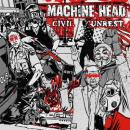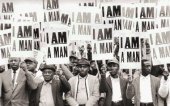The night is dark, and keen the air,
And the Slave is flying to be free;
His parting word is one short prayer;
O God, but give me Liberty!
Farewell—farewell!
Behind I leave the whips and chains,
Before me spreads sweet Freedom's plains.
One star shines in the heavens above,
That guides him on his lonely way;—
Star of the North—how deep his love
For thee, thou star of Liberty!
Farewell—farewell!
Behind he leaves the whips and chains,
Before him spreads sweet Freedom's plains.
And the Slave is flying to be free;
His parting word is one short prayer;
O God, but give me Liberty!
Farewell—farewell!
Behind I leave the whips and chains,
Before me spreads sweet Freedom's plains.
One star shines in the heavens above,
That guides him on his lonely way;—
Star of the North—how deep his love
For thee, thou star of Liberty!
Farewell—farewell!
Behind he leaves the whips and chains,
Before him spreads sweet Freedom's plains.
inviata da Pluck - 11/11/2023 - 09:27
Flying Africans are figures of African diaspora legend who escape enslavement by a magical passage back over the ocean. Most noted in Gullah * culture, they also occur in wider African-American folklore, and in that of some Afro-Caribbean peoples.
Though it is generally agreed that the legend reflects a longing for a reversal of the Atlantic slave trade, scholars differ on the extent to which this should be seen as supernatural belief or as allegory: of freedom, death, the afterlife, and even metamorphosis or reincarnation. A common Gullah etiology given for this belief is the 1803 mass suicide at Igbo Landing as a form of resistance among newly enslaved people, although versions of the legend also occur across the African diaspora.
( Wikipedia )
* The Gullah (/ˈɡʌlə/) are an African American ethnic group who predominantly live in the Lowcountry region of the U.S. states of South Carolina, North Carolina, Georgia, and Florida within the coastal plain and the Sea Islands. Their language and culture have preserved a significant influence of Africanisms as a result of their historical geographic isolation and the community's relation to their shared history and identity.
( Wikipedia )
Though it is generally agreed that the legend reflects a longing for a reversal of the Atlantic slave trade, scholars differ on the extent to which this should be seen as supernatural belief or as allegory: of freedom, death, the afterlife, and even metamorphosis or reincarnation. A common Gullah etiology given for this belief is the 1803 mass suicide at Igbo Landing as a form of resistance among newly enslaved people, although versions of the legend also occur across the African diaspora.
( Wikipedia )
* The Gullah (/ˈɡʌlə/) are an African American ethnic group who predominantly live in the Lowcountry region of the U.S. states of South Carolina, North Carolina, Georgia, and Florida within the coastal plain and the Sea Islands. Their language and culture have preserved a significant influence of Africanisms as a result of their historical geographic isolation and the community's relation to their shared history and identity.
( Wikipedia )
Pluck - 12/11/2023 - 12:12
×
![]()





Compiled by William W. Brown
Boston: Bela Marsh, 1848 - p. 47
AIR — To Greece we give our shining blades.
Anonymous Americas